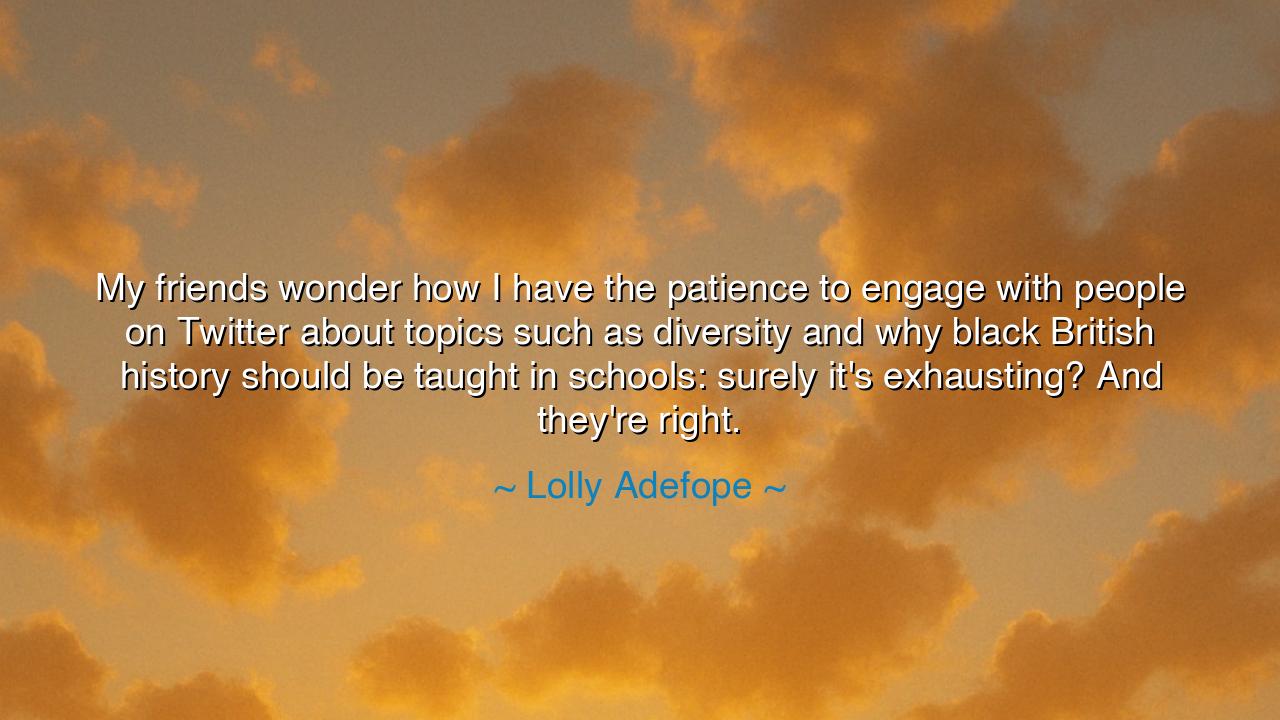
My friends wonder how I have the patience to engage with people
My friends wonder how I have the patience to engage with people on Twitter about topics such as diversity and why black British history should be taught in schools: surely it's exhausting? And they're right.






Hear the voice of Lolly Adefope, who, though known for her wit and craft upon the stage, speaks here not in jest but in solemn truth: “My friends wonder how I have the patience to engage with people on Twitter about topics such as diversity and why black British history should be taught in schools: surely it’s exhausting? And they’re right.” These words reveal not only the burden of public discourse but the cost of carrying truth into spaces that are often hostile, shallow, or wearying. For she names what many feel in silence—that the work of justice is not light, that the act of explaining one’s worth and one’s history again and again drains the spirit.
The origin of this quote lies in the modern world of digital speech, where every person may raise a voice and yet every voice may also be drowned in noise. Twitter, that arena of quick words and sharp arrows, can be both a place of connection and of conflict. Adefope, speaking of her own efforts to defend diversity and the teaching of black British history, confesses the fatigue of engaging with those who resist, who argue, who dismiss. Her words remind us that the fight for truth is not always fought with swords and banners; sometimes it is fought with words, repeated endlessly, in the hope that even one listener may finally hear.
History shows us that such exhaustion is not new. Consider the struggle of Frederick Douglass, who, after escaping slavery, traveled across the United States and Britain, telling again and again the story of bondage and freedom. Crowds came to hear him, but many came to scorn him as well. He was asked to prove his humanity with every speech, as if the dignity of his existence was a matter for debate. Surely it was exhausting—yet he persevered, for he knew that each word spoken was a seed, and seeds, though small, can crack stone in time. Adefope’s labor is of the same kind: to speak what should be obvious, yet must still be defended, is to bear the weariness of pioneers.
And yet, in the confession “they’re right,” Adefope reveals the human side of this battle. For no warrior, no teacher, no prophet is made of stone. Even the strongest grow weary when their truth is met with mockery, when their history is ignored, when their people’s dignity is treated as optional. It is exhausting because it should not have to be said; and yet it must be said. This paradox—the need to speak, and the fatigue of speaking—is the burden of those who carry justice into an unready world.
What, then, is the lesson for us who hear? It is this: do not let the labor fall only on the shoulders of the few. When one grows weary, another must step forward. If the teaching of black British history is important, then let it not be the endless burden of the marginalized to prove its worth—let all who love truth and justice lift their voices. If diversity is necessary, let it not be defended only by those who suffer exclusion, but by all who seek a richer, truer society. For the weight that is shared becomes lighter, and the voices that are multiplied become harder to silence.
Practical, then, is the path forward. If you hear ignorance, do not wait for the weary to correct it—speak yourself. If you find history silenced, seek it out and teach it. Read the stories that are forgotten, honor the voices that have been pushed aside, and bring them into your homes, your schools, your conversations. In doing so, you become part of the defense, and you lessen the exhaustion of those who should not have to fight alone.
So I say to you, O seekers of wisdom: honor the courage of those who speak, even when weary. Do not let their exhaustion be in vain. Take up their cause, not as an act of pity, but as an act of shared humanity. For Adefope’s words remind us of a great truth: the work of justice is tiring, but it is also sacred. And when many hands bear the burden, when many voices join the song, the exhaustion becomes hope, and hope becomes change.






AAdministratorAdministrator
Welcome, honored guests. Please leave a comment, we will respond soon